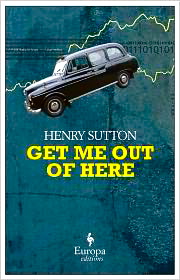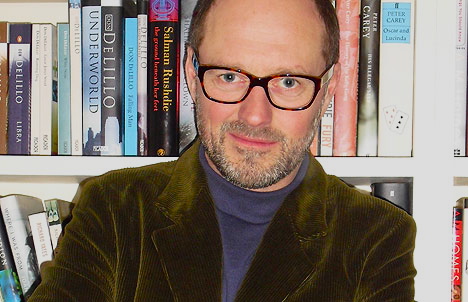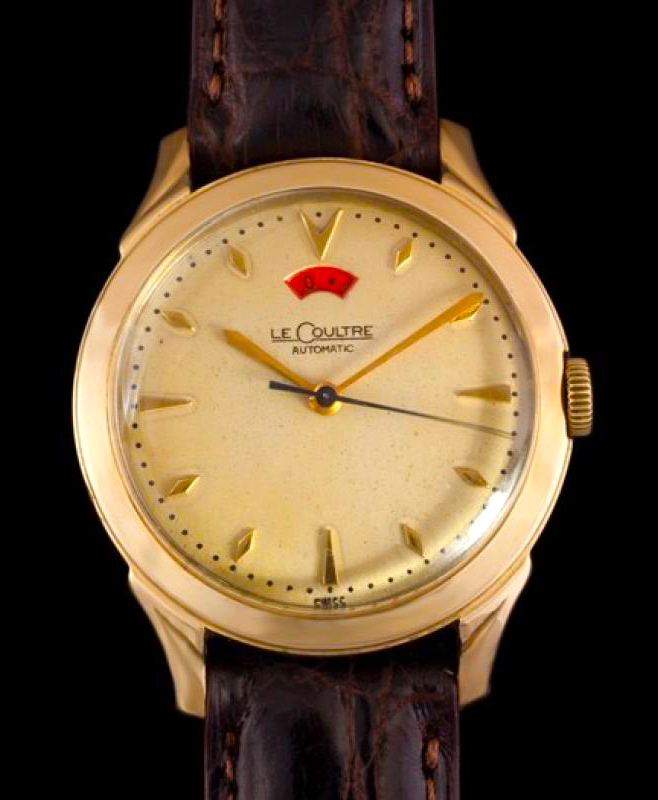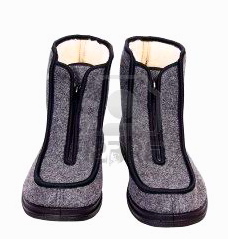“I wasn’t a complete sucker, [and Joe] didn’t scare me…He would never be able to tarnish my reputation, my standing in the business world…even if he were a lawyer. And so what if he believed he knew what I’d done, once, twice, a few times before—the pathetic accusations…But he wouldn’t catch me, nobody would.”
Described on Amazon and elsewhere as a satire and as “the first credit crunch novel,” something that, frankly, would never have lured me into reading it, Get Me Out of Here is much more like an adult version of Patrick McCabe’s novel of psychological horror, The Butcher Boy, than it is a broad picture of the London business community at large. The book focuses almost exclusively on Matt Freeman, a thirty-three year-old Londoner who is trying to run his financial business. An overly-driven yuppie with all the stereotypical hang-ups about appearances, brand names, personal connections, and the toys of success, Matt, a first person narrator, conveys every thought that enters his mind, every twisted bit of false logic, every sensation, every hope for the future, and every self-deluded justification for the crimes he commits—and he commits a lot of them. We know his personal friends, all his lovers, and his neighborhood–he is individualized, not the generic stick figure one usually sees in satires. The focus here is on the small, not the broad and universal – the life of one young man whose problems are so extreme that he cannot be considered “typical,” even among psychopaths.
on Amazon and elsewhere as a satire and as “the first credit crunch novel,” something that, frankly, would never have lured me into reading it, Get Me Out of Here is much more like an adult version of Patrick McCabe’s novel of psychological horror, The Butcher Boy, than it is a broad picture of the London business community at large. The book focuses almost exclusively on Matt Freeman, a thirty-three year-old Londoner who is trying to run his financial business. An overly-driven yuppie with all the stereotypical hang-ups about appearances, brand names, personal connections, and the toys of success, Matt, a first person narrator, conveys every thought that enters his mind, every twisted bit of false logic, every sensation, every hope for the future, and every self-deluded justification for the crimes he commits—and he commits a lot of them. We know his personal friends, all his lovers, and his neighborhood–he is individualized, not the generic stick figure one usually sees in satires. The focus here is on the small, not the broad and universal – the life of one young man whose problems are so extreme that he cannot be considered “typical,” even among psychopaths.

Though Matt is an emotional mess, his problems started well before the country’s current economic problems and its “credit crunch,” and we never know exactly when or why. He is single, having had several intense relationships, one of which, with Fran, almost led to the altar, but he is totally ego-driven, unable to share or participate in any relationship as an adult. As his current girlfriend says at the beginning of the novel, “With you it’s always me, me, me. ‘Oh, I’m so busy, you wouldn’t understand. Poor me. It’s not my fault but his fault of her fault or the weather’s fault’…You’re nothing but a leech.” With brilliant irony and mordant wit, which becomes ever more obvious as the novel progresses, Matt announces to the reader that “I wasn’t going to inform her that, actually, leeches had numerous beneficial uses, especially when it came to bloodletting.”
 Within the first forty pages, Matt Freeman has already committed a murder. But “it’s not his fault.” It’s the victim’s own fault. She wouldn’t have ended up dead at all, he tells us, if it hadn’t been for the “cheap, man-made material” in the neck of the shirt she was wearing. “Another branded ripoff. She should have stuck to John Smedley [designer knitwear], like me.” Addicted to recognizable labels, Matt believes that they are essential to maintaining the appearance of success in London’s financial world. We never find out much about what he did, exactly, before he started his own business, nor do we know, even, whether this business is, or ever was, real, but he tells friends that he is working on a big business deal with North Korea, talks about all his travels all over the world, and indicates that he is also working on deals with Iran and Kuwait. He frets, fusses, and fumes his way through his life, sharing every piece of trivia. Slowly, the reader realizes that he is also having some financial problems, though typically, he never admits this.
Within the first forty pages, Matt Freeman has already committed a murder. But “it’s not his fault.” It’s the victim’s own fault. She wouldn’t have ended up dead at all, he tells us, if it hadn’t been for the “cheap, man-made material” in the neck of the shirt she was wearing. “Another branded ripoff. She should have stuck to John Smedley [designer knitwear], like me.” Addicted to recognizable labels, Matt believes that they are essential to maintaining the appearance of success in London’s financial world. We never find out much about what he did, exactly, before he started his own business, nor do we know, even, whether this business is, or ever was, real, but he tells friends that he is working on a big business deal with North Korea, talks about all his travels all over the world, and indicates that he is also working on deals with Iran and Kuwait. He frets, fusses, and fumes his way through his life, sharing every piece of trivia. Slowly, the reader realizes that he is also having some financial problems, though typically, he never admits this.
![]()
Author Henry Sutton is clearly having fun as he creates this character and then lets him wreak havoc on those around him. Matt Freeman (the name, alone, is ironic) is so wild and, literally, crazy, that readers will be reading about his actions with horror at the same time that they are chuckling because he is so twisted. His ego is so sensitive, and his need to be important is so great, that he misreads even ordinary comments, taking everything as a personal insult, and, unfortunately, often feeling the need for serious redress. As Matt’s already limited hold on reality crumbles further, he becomes ever more imaginative in finding ways to stay ahead of the pack (including the police). The body count rises and keeps rising, as does the reader’s involvement and appreciation of the author’s cleverness.
 In addition to creating a compelling character in Matt Freeman, Sutton also includes unique descriptions of such arcane subjects as Matt’s personal “television free zone,” the smells of Kentucky Fried Chicken vs. Burger King when eaten by passengers on the Tube (“KFC was a notch or two above Burger King when it came to pungency.”), and the dental hygiene of the North Koreans. (“For some reason I couldn’t imagine the North Koreans flossing their teeth with any regularity or passion.”) He often tells the story obliquely, creating “ah-ha” moments for the reader who has suddenly figured out what has happened by reading into Matt’s comments and realizing what he does NOT say. And he also tantalizes the reader by leaving much unresolved at the end. After all, Matt, the narrator, does not know what will happen, either.
In addition to creating a compelling character in Matt Freeman, Sutton also includes unique descriptions of such arcane subjects as Matt’s personal “television free zone,” the smells of Kentucky Fried Chicken vs. Burger King when eaten by passengers on the Tube (“KFC was a notch or two above Burger King when it came to pungency.”), and the dental hygiene of the North Koreans. (“For some reason I couldn’t imagine the North Koreans flossing their teeth with any regularity or passion.”) He often tells the story obliquely, creating “ah-ha” moments for the reader who has suddenly figured out what has happened by reading into Matt’s comments and realizing what he does NOT say. And he also tantalizes the reader by leaving much unresolved at the end. After all, Matt, the narrator, does not know what will happen, either.

Sutton does, occasionally, draw parallels to world-wide economic situations during the novel, but Matt Freeman is so out of touch with the reality of his own actions that it is difficult to see any way in which these domestic or international crises affect him directly. In one wonderful parallel, full of irony, Matt muses, “Iraq, Iran, Afghanistan, Zimbabwe, North Korea, all still out of control in their various ways, and with no one from the so-called international community able to do very much, despite all the…good intentions…No one ever acts in time, or with enough intelligence. Or force.” He does make reference, occasionally, to current financial conditions, but as he has blamed everything and everyone imaginable for his problems, these accusations become paranoid “throwaways.” As the novel draws to a close and his problems reach their peak, Matt has a sudden “insight.” “My time was coming,” he says, “Oh yes. Finally I’d be able to realize my full potential, unchecked, unhampered by outdated institutions and shallow convictions….[because] I was..the one with the imagination, the vision, the energy.”
Photos related to the action: The author’s photo is from http://blogs.mirror.co.uk
Matt Freeman’s prized possession is a vintage 1952 Jaeger LeCoultre watch: http://www.portero.com
He is planning to upgrade his camera to a new, state-of-the-art Leica digital, with 10 megapixels: http://www.amazon.com
Former girlfriend Jeanette once invited him to take a vacation with her to a villa in Marbella, Spain. http://www.dmproperties.com
He is appalled by the unfashionable grey felt shoes with zippers, worn by his brother, who lives in Norway. Photo by Ivan Gulei: http://m.123rf.com
